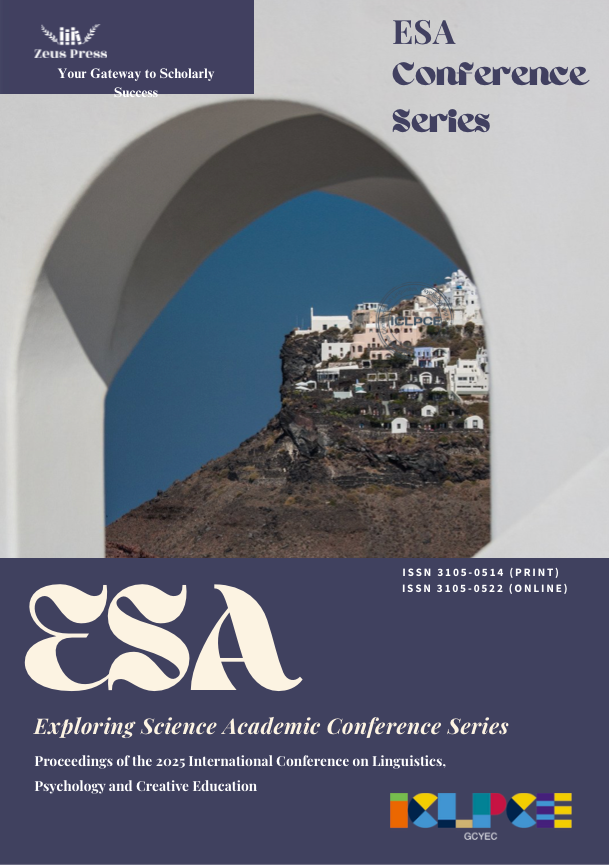The Proposal and Application of the Concept of “Meta-Integration”—Taking the Analysis of the Psychological Mechanism of Game Addiction as an Example
Main Article Content
Keywords
meta-integration, organic wholism, meta-cognition, integration, game addiction
Abstract
With the development of science and technology and continuous social progress, the material living space of individuals (referring to objective reality) has gradually expanded. As a reflection of the material world, conscious activities have also become increasingly complex and diverse. The “cognitive unit” of an individual is formed through the logical construction of perceptions of the material space at the conscious level. Furthermore, “cognitive units” can be constructed into a “cognitive organic whole” through certain logical connection methods. To maintain balance and stability in dynamic interactions with the environment, it is necessary for the “cognitive organic whole” to remain in a harmonious state. In response, the article proposes the “meta-integration” theory. As a cognitive adjustment method, “metaintegration” can promote the smooth operation of the “cognitive organic whole” by changing the logical connection methods within and between “cognitive units,” thereby breaking through cognitive dilemmas. With the development of science, technology and the internet, the scope of individuals' conscious activities has expanded to the virtual space. If the effective cognitive construction of perceptions of the virtual world cannot be achieved at the conscious level, cognitive dilemmas may arise, which are externally manifested as the problem of online game addiction. This article provides an in-depth interpretation of the concept of “metaintegration” and illustrates its application adaptability through its mechanism of action in solving the problem of game addiction.
References
- Bhagat, S., Jeong, E. J., & Kim, D. J. (2020). The role of individuals’ need for online social interactions and interpersonal incompetence in digital game addiction. International Journal of Human-Computer Interaction, 36(5), 449-463. https://doi.org/10.1080/10447318.2019.1654696
- Canale, N., Marino, C., Griffiths, M. D., Scacchi, L., Monaci, M. G., & Vieno, A. (2019). The association between problematic online gaming and perceived stress: The moderating effect of psychological resilience. Journal of Behavioral Addictions, 8(1), 174-180. https://doi.org/10.1556/2006.8.2019.01
- Chen, B. B. (2022). Crisis and redemption [Master's thesis, Zhejiang Normal University]. CNKI. https://link.cnki.net/doi/10.27464/d.cnki.gzsfu.2022.000335
- Efklides, A., & Misailidi, P. (2010). Introduction: The present and the future in metacognition. In A. Efklides & P. Misailidi (Eds.), Trends and prospects in metacognition research (pp. 1-18). Springer US. https://doi.org/10.1007/978-1-4419-6546-2_1
- Green, R., Delfabbro, P. H., & King, D. L. (2020). Avatar- and self-related processes and problematic gaming: A systematic review. Addictive Behaviors, 108, Article 106461. https://doi.org/10.1016/J.ADDBEH.2020.106461
- Green, R., Delfabbro, P. H., & King, D. L. (2021). Avatar identification and problematic gaming: The role of self-concept clarity. Addictive Behaviors, 113, Article 106694. https://doi.org/10.1016/J.ADDBEH.2020.106694
- Hammadi, S. S. (2023). Mental space theory: A review of cognitive processes and applications. Journal of Language and Linguistics in Society, (31), 42-47. https://doi.org/10.55529/JLLS.31.42.47
- Hammond, H. (2015). Social interest, empathy, and online support groups. The Journal of Individual Psychology, 71(2), 174-184. https://doi.org/10.1353/JIP.2015.0008
- Jeong, E. J., & Kim, D. H. (2011). Social activities, self-efficacy, game attitudes, and game addiction. Cyberpsychology, Behavior, and Social Networking, 14(4), 213-221. https://doi.org/10.1089/CYBER.2009.0289
- Klinger, E. (1978). Modes of normal conscious flow. In K. S. Pope & J. L. Singer (Eds.), The stream of consciousness: Scientific investigations into the flow of human experience (pp. 225-258). Springer US. https://doi.org/10.1007/978-1-4684-2466-9_9
- Lang, J. (2011). A brief analysis of Piaget's cognitive development theory. Technology Information, (15), 160+159.
- Leménager, T., Gwodz, A., Richter, A., Reinhard, I., Kämmerer, N., Sell, M., & Mann, K. (2013). Self-concept deficits in massively multiplayer online role-playing games addiction. European Addiction Research, 19(5), 227-234. https://doi.org/10.1159/000345458
- Li, H., & Zhang, W. (2006). Review of the studies on psychological resilience. Journal Shandong Normal University, 51, 149-152.
- Li, H., Zhao, X., & Wang, W. (2021). A review of the research on social vulnerability. Journal of Catastrophology, 36(2), 139-144. https://doi.org/10.3969/j.issn.1000-811X.2021.02.016
- Li, Y. W., & Pan, X. (2015). A review of adler's social interest theory research. Technology Outlook, 25(6), 237.
- Liu, Q. P. (2021). The relationship between “is” and “ought” from the perspective of two types of needs. Contemporary Chinese Values Studies, 6(1), 22-30.
- Melodia, F., Canale, N., & Griffiths, M. D. (2022). The role of avoidance coping and escape motives in problematic online gaming: A systematic literature review. International Journal of Mental Health and Addiction, 20(2), 996-1022. https://doi.org/10.1007/S11469-020-00422-W
- Neumann, E. (2015). The origins and history of consciousness. Routledge.
- Nie, M. H. (2021). Promoting adolescent mental health under the ecosystem theory. Literature and Science Navigation, (7), 93-94.
- Ramirez, N. R. (2012). Treating video game addiciton: Reality therapy based group counseling (Publication Number 1548432) [Master's thesis, Saint Mary's College of California]. ProQuest.
- Ryum, T., & Nikolaos, K. (2024). Elucidating the process-based emphasis in cognitive behavioral therapy. Journal of Contextual Behavioral Science, 33, Article 100819. https://doi.org/10.1016/j.jcbs.2024.100819
- Xing, S., & Yu, G. (2005). A review on research of social comparison. Advances in Psychological Science, 13(1), 78-84.
- Yu, J., & Du, C. M. (2009). Review the research on self-concept of adolescence. Journal of Heilongjiang College of Education, 28(1), 81-83.
- Zarski, J. J. (1981). Social interest, life changes and mood states. American Mental Health Counselors Association Journal, 3(1), 27-34.
- Zhang, Q. (2011). On study of psychological health education of college students in the construction of harmonious society [Paper presentation]. Proceedings 2011 International Conference on Human Health and Biomedical Engineering, HHBE 2011, Jilin, China.


